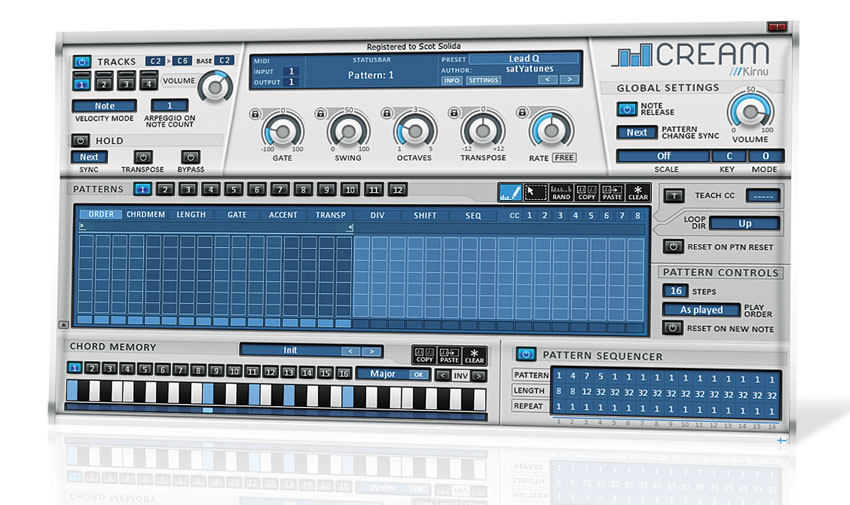MusicRadar Verdict
A kick-ass arpeggiator with a mind- boggling array of MIDI-generating and manipulation systems on board.
Pros
- +
Awesome arpeggios and more. Powerful Pattern Sequencer. Killer Chord Memory. Flexible, creative Pattern Data section. Four independent tracks. Independently loopable pattern controls.
Cons
- -
Some controls fiddly to use.
MusicRadar's got your back
It would appear that the death of the MIDI effect has been greatly exaggerated. We've only just wrapped up our Xfer Records Cthulhu review and along comes Cream, a super-charged version of Kirnu 1, Arto Vaarala's awesome donationware arpeggiator plugin.
Cream is a VST/AU plugin for PC and Mac, available in 32- and 64-bit versions. Experienced AU users will know what's coming next: since Cream works as a MIDI effect, you'll have to do a little extra work to get it working with your Audio Units instrument plugins, and you'll suffer a nominal hit in latency for your efforts. The developer recommends using the VST version where possible.
"To call Cream simply an arpeggiator or even a pattern sequencer is to do it a disservice"
To call Cream simply an arpeggiator or even a pattern sequencer is to do it a disservice. While it can do those things (and function as an auto-chord player, too), it's more interactive than a standard arpeggiator or step sequencer.
A Global section sits at the top of Cream's architecture. Here you can set the volume, the Scale to which the output will adhere, the way patterns are switched (on the next step, every fourth, eighth or 16th), and whether the pattern is restarted immediately when all notes are released.
Down a level, we get to the Tracks section. There are four tracks, each one hosting its own Pattern Data section (see below), arpeggiator and Pattern Sequencer. You can assign each track to a specific note range and MIDI channel, enabling different sounds to be played on a multitimbral synth or multiple MIDI instruments simultaneously.
One particularly neat feature is Arpeggio On Note Count, which delays the start of the arpeggiator until a specified number of notes are played, allowing you to play a regular melody line before the arp kicks in.
Pattern recognition
"Cream's powerful Pattern Data section is the heart and soul of the device"
Cream's powerful Pattern Data section is the heart and soul of the device. You can create and store up to a dozen patterns per track (of up to 32 steps each) and trigger them manually, via MIDI or using the wicked onboard 16-step Pattern Sequencer.
Want all the hottest music and gear news, reviews, deals, features and more, direct to your inbox? Sign up here.
Each pattern controls a number of discrete functions, tabbed at the top of the display. You can create patterns governing note order, chord memory playback, step length, gate, accent, note division, transposition, note shift, the note sequence of the held chord, and even MIDI CCs (up to eight of them, user-assignable).
What's more, each of these sections is independently loopable. As you can imagine, this level of data control results in a vast amount of manipulation potential for each pattern and Track. It's a simple matter to transform even the simplest chord into a complex musical passage that you'd have been very unlikely to come up with without Cream. On the downside, some of the control adjustments seem a bit fiddly, but that's a minor quibble in light of the power on offer.
Cream of the crop
Sometimes it feels like the music software industry is slowly creeping towards genericism. Cream reminds us of a time when developers were wildly experimental, cobbling together tools that were outside the norm, yet fun and inspirational to use.
Unlike your standard arpeggiator, Cream offers enough programmability to ensure that, with a bit of effort, the results are yours and yours alone. That's a pretty big promise to make, but Cream delivers, and for a ridiculously low price.
Computer Music magazine is the world’s best selling publication dedicated solely to making great music with your Mac or PC computer. Each issue it brings its lucky readers the best in cutting-edge tutorials, need-to-know, expert software reviews and even all the tools you actually need to make great music today, courtesy of our legendary CM Plugin Suite.

